In a recent episode of the Pow Wow Life podcast, host Paul Gowder interviewed Byron Graves, an Ojibwe and Lakota author from the Red Lake Indian Reservation. Graves discussed his debut novel, “Rez Ball,” which delves into the world of Native American high school basketball and the universal themes of dreams, challenges, and self-discovery. This article will explore the importance of Native American representation in storytelling, focusing on the impact it has on youth identity, the growth of a cultural renaissance, and the power of inspiring others through authentic narratives.
- Hardcover Book
- Graves, Byron (Author)
- English (Publication Language)
- 368 Pages - 09/12/2023 (Publication Date) - Heartdrum (Publisher)
PowWows.com earns commissions from Amazon.com
Embracing the Art of Storytelling:
Graves, fondly nicknamed Art and Saw, has always been drawn to the art of storytelling. After experimenting with various forms of creative expression, such as poetry, music, and acting, he found that writing allowed him the freedom to fully explore his passion. Writing became his medium of choice, offering a personal and independent way to share stories with the world.
Fighting for Authenticity:
Before “Rez Ball,” Graves penned a book called “Fighting Chance,” which explored the challenges faced by an Ojibwe boxer. This work caught the attention of literary agent Keri Wolfe, affirming Graves' talent as a writer. Inspired by the maxim “write what you know,” Graves embarked on a journey to create a story that would resonate specifically with Native American teenagers, highlighting their experiences, dreams, and struggles.
Reviving Representation:
One of the recurring themes in Graves' interview was the need for Native American representation in mainstream media. The lack of relatable role models during his youth inspired him to create a story that adolescent Native Americans could see themselves reflected in. By offering authentic narratives and characters, Graves seeks to empower and uplift Native youth, encouraging them to pursue their dreams despite the obstacles they may face.
The Power of Rez Ball:
“Rez Ball” is not just a sports novel; it is a coming-of-age tale that resonates with a wide array of readers. While the book centers around the world of reservation basketball, the underlying message invites all individuals, regardless of their background, to connect with the story of self-discovery, resilience, and the pursuit of passion. Graves' book is a testament to the universal human experience, proving that authentic and relatable stories transcend cultural boundaries.
A Renaissance of Native American Storytelling:
Graves shared his enthusiasm for the recent surge of Native American storytelling in mainstream media. From television shows like “Rez Dogs” and “Rutherford Falls” to an array of brilliant Native American authors, storytelling is experiencing a renaissance within Indigenous communities. This resurgence allows Native youth to see themselves represented on screen, encouraging them to explore their own creative potential and pursuit of art.
Impact on Native Communities:
The influx of Native American representation has been affirming for Graves and his fellow Indigenous storytellers. It serves as a reminder that their narratives matter and have an eager audience hungry for diverse voices. With the ability to inspire, uplift, and connect with a wider audience, Native storytellers are becoming pioneers, paving the way for future generations to embrace their heritage, culture, and creative aspirations.
Rez Ball – Overcoming Challenges and Realizing Potential
Byron Graves' interview in the Pow Wow Life podcast sheds light on the importance of Native American representation in storytelling. Through his debut novel, “Rez Ball,” Graves seeks to empower and inspire Native American youth, offering them authentic stories that mirror their own experiences and dreams. The renaissance of Native American storytelling happening in mainstream media reflects a collective hunger for diversity and inclusivity, and as the world embraces these narratives, it encourages cultural growth and acceptance. The ripple effect of representation is profound, as it not only celebrates Indigenous identities but also encourages communities to embrace their heritage and stories. With each new story shared, the collective voice of Native American storytellers becomes stronger and more influential, ensuring that the upcoming generations feel seen, empowered, and capable of shaping their own narratives.
Transcript
[00:00:12] Paul Gowder:So, let's talk about tonight's guest. His name is Byron Graves. He's an Ojibwe, born and raised in Red Lake Indian Reservation, where he played high school basketball. So, he has a little bit of knowledge on the subject, and when he isn't writing, he can be found playing video games.
[00:00:25] He loves the retro video games, spending time with his family. And cheering on the beloved Timberwolves, like being a Carolina Gamecock fan down here in the South, that is a tough team to pull for. But he now lives in Denver, and this is his debut book, so I hope you enjoy my interview with Byron Graves.
[00:00:49] Alright, I'm super excited to have you tonight, I appreciate you spending some time with me. Let's get right to it and tell me more about yourself and this book you have coming out.
[00:00:58] Bryon Graves: Yeah, so um, my name is Byron Graves. I'm Ojibwe and Lakota from the Red Lake Indian Reservation and my debut novel, Res Ball, kind of recaps some of the stories of um, playing Basketball for the Red Lake Warriors and, uh, kind of, it's also universal, um, for anybody who understands what res ball is.
[00:01:16] So I'm excited to be here with you today and chat a little bit about it.
[00:01:21] Paul Gowder:Awesome. So, you know, I was reading some of your, um, other interviews and things you've done online and, and I saw, you know, you've had a long time nickname of Art and, and Saw, so you talked about this, you know, you were always into the art of storytelling, so mm-hmm.
[00:01:34] at what point did you decide that you wanted to like, you know, take part and actually be a storyteller yourself?
[00:01:41] Bryon Graves: Um, it was probably about 10 years ago, um, where I figured out how I was going to tell stories, right? So, I was dabbling in writing poetry, dabbling in writing music, I was, um, dabbling in acting, and all those things are, you know, amazing forms of expression and an ability to, um, try to tell the story you want to tell in some way, shape, or form.
[00:02:05] Um, but they all involve… Uh, so many other people and so much time in some circumstances and in other situations, um, money. Um, but writing was all about me, the amount of time I wanted to commit to it. Um, it was free. Um, so it was something where, I finally was like, hey, I know what I want to do. I know I have this love for words and this love for storytelling.
[00:02:30] And how can I do that in a way where it's just dependent 100% on me showing up, me putting in the time, me learning how to do it. Um, so this 10 years has been quite a journey and it really, um, kind of came to fruition the last couple of years, but it's been the same game the whole time. All right.
[00:02:48] Paul Gowder:So you mentioned you, you wanted to kind of tell the story of.
[00:02:52] Some of the things you participated in, too. So, um, you know, besides pulling from your past, was Resball the first real story that you wanted to tell in a book form, or had there been others that you're working on? You know, how did, how did that come about?
[00:03:06] Bryon Graves: Um, so I wrote a book called Fighting Chance, which was about a Sieh, boxer, an Ojibwe boxer, who, um, had all the potential in the world, um, and had some different challenges holding them back.
[00:03:18] So, at that time I was trying to tell that story of, um, you know, mental health challenges, any kind of addiction challenges, but also having big dreams and having a ton of potential, which I think, you know, a lot of Natives can relate to. Um, and that book got me my agent, um, so I put that out into the world.
[00:03:35] I was trying to shop it around. My agent, uh, Keri Wolfe with AKA Literary, she loved it, um, really cemented in that I was on the right path and that I was actually, um, someone who was capable of writing. So I, I didn't know if I was really sure if it was something I was. Good at, something I could do, um, so that book, um, you know, Taking Sports, which I'm a huge fan of, um, and they always say write what you know, so that was the first book where I really figured out, um, what I was doing and how I wanted to do it.
[00:04:07] Paul Gowder:Alright, so tell us a little bit about the book. What, you know, when this comes out in September, what are we looking for? And who is this suited best
[00:04:14] Bryon Graves: for? Um, a wide range of people. I mean, I, I wrote it for, um, teenage Native Americans. Um, even if they're not sports fans, it really is a universal tale of just a coming of age story of what it's like to, um, have big dreams.
[00:04:33] Um, maybe have this card stacked against you, maybe be a little bit insecure, um, but deep down inside knowing that you've got something special to share with the world and how scary that can be. So, that was my main audience every single time I had to sit down, um, you know, worn out from my nine to five or wanting to just hang out and chill on the weekends.
[00:04:54] Um, you know, getting that extra little bit of energy, that, um, second wind, if you will. Uh, it was always for that, that teenage audience who, um, growing up, I didn't see myself represented like that. I couldn't just go grab a book that had a Native American, a basketball player, a teenager. Um, I tried to keep the book really authentic, I felt like, in a lot of ways.
[00:05:14] Um, so. That was my main audience, but, uh, I think, I think almost anybody could pick it up and read it and relate to it.
[00:05:23] Paul Gowder:You mentioned representation and not having sort of those role models coming up. And when I interview people, we always, that seems to come up more and more. And I, I'm always excited to interview another person, whether it's an author, um, a TV celebrity or a producer, whatever.
[00:05:41] Because you guys are now setting paths for Native youth to be able to follow, and it's pretty exciting things. We're seeing Rez Dogs, and Rutherford Falls, and some of these stories really hit mainstream. It has, how, have you seen any of this happening so far? You know, how has it affected where you're from
[00:05:59] Bryon Graves: at all?
[00:06:02] It has been… Affirming, it's made me feel not alone. It's made me see that there's a, there's a hunger and a thirst for that type of storytelling and for Native American representation out there. So like, like you said, like something like Rez Dogs, I actually am always so behind the curve with whatever is new and what's ever cool and whatever is going on.
[00:06:25] Like, for example, I watched Breaking Bad like ten years after everybody cared about it. Season 2 of Rez Dogs and Season 3 is out now and I'm gonna go watch a couple of episodes after this that just came out, but I was watching um, the end of Season 2 and Just couldn't believe, um, the storytelling, the acting, the directing, and just seeing that on TV.
[00:06:48] I looked at my partner when, um, that ended, and I was teary eyed, and I just couldn't believe what I had just seen. One of the greatest television shows, in my opinion, of all time, and I was like, oh my god, I would have loved to have seen something like this when I was 15, 16, 17, and you can take it however you want.
[00:07:04] Would that have inspired me earlier to try to write? Would have inspired me earlier to take on some creative endeavors? Or would it have just Allowed me to see myself as a character on TV and someone who's out there, you know, so it's been, like I said, early on, uh, at the beginning of my answer, affirming, I see so many other people.
[00:07:21] There's so many brilliant Native American authors out there. So many creative Native American, uh, people of all different, um, facets of the industries out there. So, um, it's just been a beautiful thing. It's like a renaissance, you know, it's just so many people out there doing their thing and I'm so proud of all of them and even to be just a teeny tiny little part of that is just, you know, couldn't ask for anything more.
[00:07:44] Yeah, I've
[00:07:44] Paul Gowder:described it the same way. It's a renaissance. It's a, it's such a opening and exciting time. I'm, for me, I'm really looking forward to see what happens in five years. Not only for Native youth who feel inspired and like you said, affirmed and accepted, but now. Um, there is like, you, I think you used the word craving.
[00:08:08] There's a craving for these stories and, you know, what's, what new stories are going to get to be told in mainstream is going to be pretty exciting. Um, so let's talk about ResBall itself. It's talking about something going mainstream, whether it's some of these tournaments that have just grown in size to a documentary coming out on, is it Netflix or one of the platforms.
[00:08:32] Tell, for somebody who's not familiar with Res Ball, sum up the, you know, what, what is Res Ball and how is it different than other basketball that people have seen?
[00:08:42] Bryon Graves: I guess, um, for like a mainstream audience, someone who didn't know Res Ball, someone who knew nothing about Native American basketball, I would sum up Res Ball by saying it's street ball.
[00:08:53] And what I mean by that is it's creative. It's in the moment. It's not stopping to call a play. It's not trying to run a pick and roll. It's really letting the game come to you. And it's fast paced. It's exciting. It's run and gun. It's shooting threes. It's throwing a behind the back pass. It's like an NBA all star game.
[00:09:14] Um, but just, that's just the way we hoop. You know, if you go, you go to any res and you go. Check out a pickup game. There's going to be someone taking a three from 35 feet. There's going to be someone with a dunk or a fancy pass. So, um, I just wanted to like capture the essence of that letting, uh, you know, when all of us are on the court together, um, it's, it's creativity is poetry in motion, you know?
[00:09:37] Paul Gowder:Awesome. So your book comes out in September. It's going to be available, uh, I assume on all the major platforms. So are we doing, are we traveling around any, any, anywhere people can find you if they're looking after they enjoy the book, uh, where will you be in the next few months?
[00:09:54] Bryon Graves: Yeah. So, um, September around the launch date, we're doing a, uh, date in, Minneapolis, um, September 12th.
[00:10:02] Uh, still getting the last little bit of a lockdown, but it sounds like it's a go for Birchbark Books. So, really excited about that. Always been a huge fan of that store. And, uh, then I'm going to do a couple of events in northern Minnesota, which is where I'm from. So, I'm going to, um, be at the Red Lake Nation College, um, Thursday.
[00:10:18] I believe it's September 14th or 15th. I'd have to look at a calendar. And then that Saturday, I'm going to be in Bemidji, Minnesota, um, doing another book event at Four Pines Bookstore. Um, so yeah, I'm going to try to get three in there that first week of launch and kind of different areas of the state.
[00:10:33] Um, different audiences, connect with all my family and friends and community members and people from my tribe and just have a good time and, you know, get to share this moment with everybody.
[00:10:44] Paul Gowder:Great. Uh, going forward, do you see yourself telling? More sports stories, you know, where do you feel like you're gonna head next in your creative endeavors?
[00:10:54] Bryon Graves: Oh, well, the book I'm working on right now is actually, um, very similar to Res Ball, but I wanted to go a little bit more of an alternative path because, you know, like, um, I don't know if it's just a trope, but there's always like the jocks in high school and then there's always like The alternative kids or the everybody else, you know?
[00:11:12] So my next book is about, and it still involves sports, but it's about a skateboarder, um, who's finding his place in the world and using skateboarding partially as escapism, but partially as a thing that's helping him build his own confidence in himself in every other facet of his life. Um, and skateboarding takes such an incredible discipline and it's such a gutsy thing to do.
[00:11:34] And it's one of the most frustrating things that you could ever try to do. Um, and the amount of time it takes to get even like incrementally good at something is mind numbing. Um, so I, I picked up. and learned how to skateboard as I was working on this book. So definitely, um, there's some, uh, parallels between Resball and my next book, which is still a Native American teenager and still has sports in it.
[00:11:58] Um, so that's where I see myself for the next couple of books, but definitely wide open, um, to continue to expand. Um, I love video games, so I definitely see, um, maybe expanding into the gamer world. Um, so doing like a Native American gamer book at some point. Um, but yeah, it's wide open, just kind of taking it one book at a time.
[00:12:17] So when I'm working on something, it's all consuming. It's like all I think about, um, I can't really get into any other projects or think about anything else cause I'm just immersed in it 100%. So I'm just about done with this book. And then it'll be time to say, Hey, what's next.
[00:12:32] Paul Gowder:I like the idea of, of an e sports book.
[00:12:34] I mean, that whole market has. Really exploded, and to be able to tell you know, maybe put an indigenous character in the middle of that, that could be interesting because yeah, that's a really crazy world right now. Interesting all right, cool. Well I appreciate you coming on anything else you want to pass on for the folks watching as they as we're getting ready for the
[00:13:00] Bryon Graves: Um, if you can go out and if you're interested in getting Resball, there's so many different ways that you can get it, um, and, uh, support and help out, um, you can go request it at a local library, um, pre orders are huge, um, getting it for a gift for someone, even if you're not a reader, but you want to support a Native American author, you want to support Native American creativity, um, there's so many things you can do as far as just getting a copy and giving it to someone, donating it.
[00:13:25] Whatever you want to do. One of those little, um, free libraries that are on the street. Go put one in there. Um, but all the support really helps to continue to fuel um, all of us who are out here creating and writing and it's unbelievably appreciated. I know every Native American, uh, creator out there. Um, appreciates the support of Indian country and it matters so much.
[00:13:46] So it allows us to keep doing what we're trying to do.
[00:13:49] Paul Gowder:I love what you just said. And my daughter for when she was in Girl Scouts, I actually did a project of making, uh, the little lending libraries to put at a camp. Uh, and I do, you see them everywhere. And so I'm challenged the audience. Buy a book and put put one of these books in there.
[00:14:05] Think of what you could do is, you know, spreading an indigenous story and these creative characters and relatable storylines that maybe people in your area haven't seen or heard. It's a great way to get some of these stories and authors out there and exposure. Love it. Love it. Let's do that. Let's share these stories more.
[00:14:25] Bryon Graves: 100%. Couldn't agree more.
[00:14:28] Paul Gowder:Well, thanks so much for being on and I look forward to the launch and we'll make sure we'll have links and everything too below so everybody knows where to go and purchase that book.
[00:14:36] Bryon Graves: Awesome. Thank you so much. It was an honor being on your show. I really appreciate it. Thanks.
[00:14:41] All right. Bye.
[00:14:43] Paul Gowder:There you have it. Thanks so much, Byron, for coming on. It sounds like a cool book and he's going to have some more stories coming. I'm excited. Powwows. com slash books support him and our other native artists. And I love the idea. I'm serious, y'all. If there's a lending library close to your house or in your neighborhood or on your commute, pick up a book and just slip it in there, right?
[00:15:03] You don't don't even worry about if you want to take one that's there. Just slip a couple in and let's see if we can spread These stories and help these native authors get to a wider audience. Love that idea.
[00:15:15] Gowder, and I thank you so much for being here. I appreciate you are the reason that powwows. com is what it is. Our community out there is fantastic, and I appreciate you being a part of it.
[00:15:26]
Last Updated on December 12, 2023 by Paul G
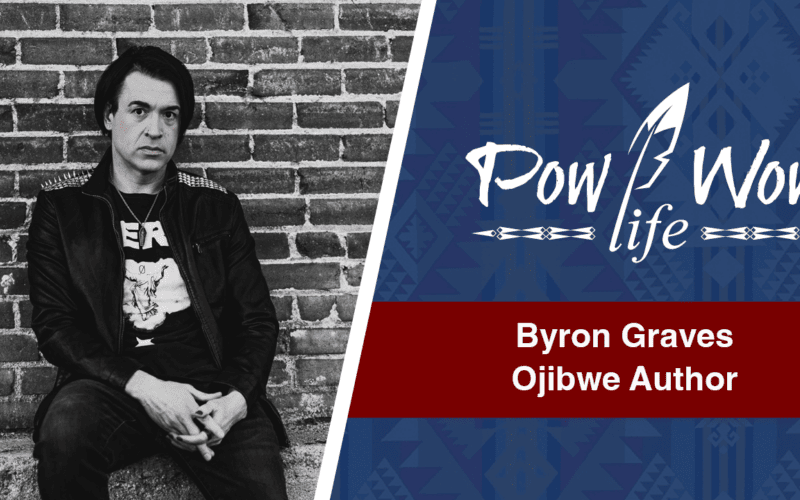

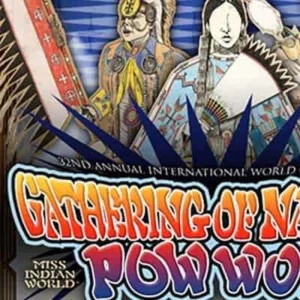
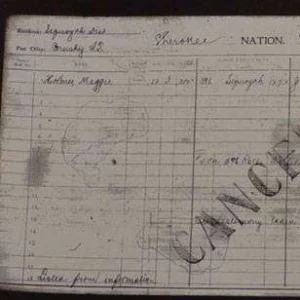
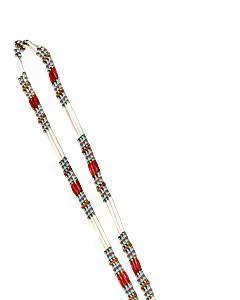
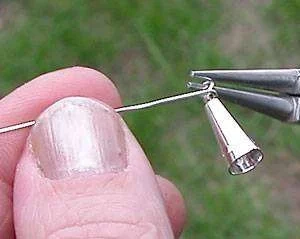
Edgar Villarreal
says:Amazing and beautiful creation and learning story. I thank you for the insight and knowledge.